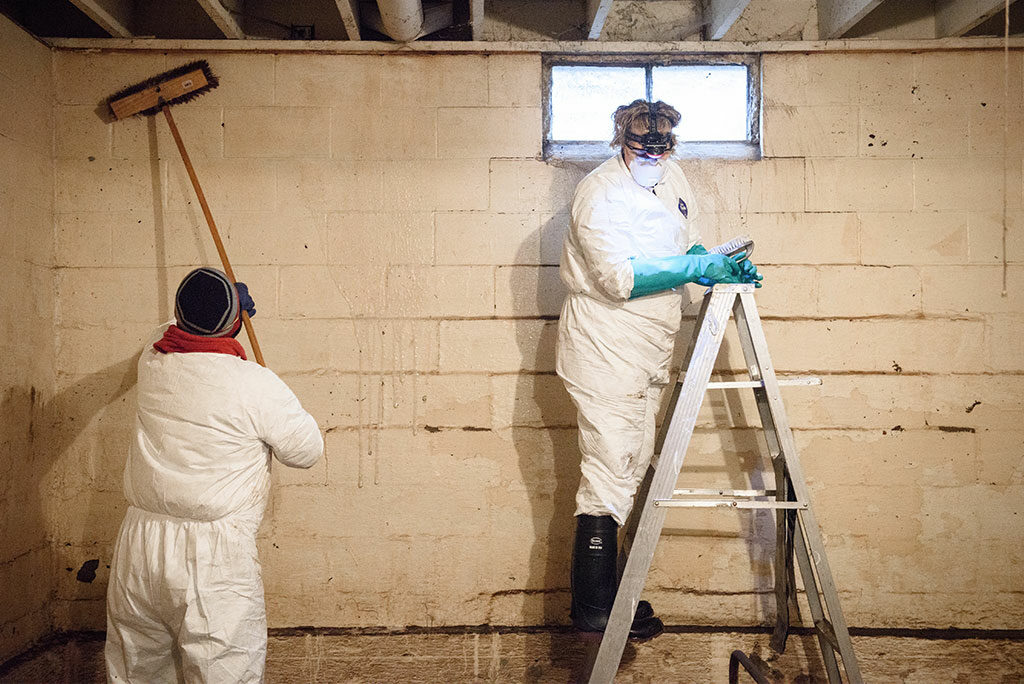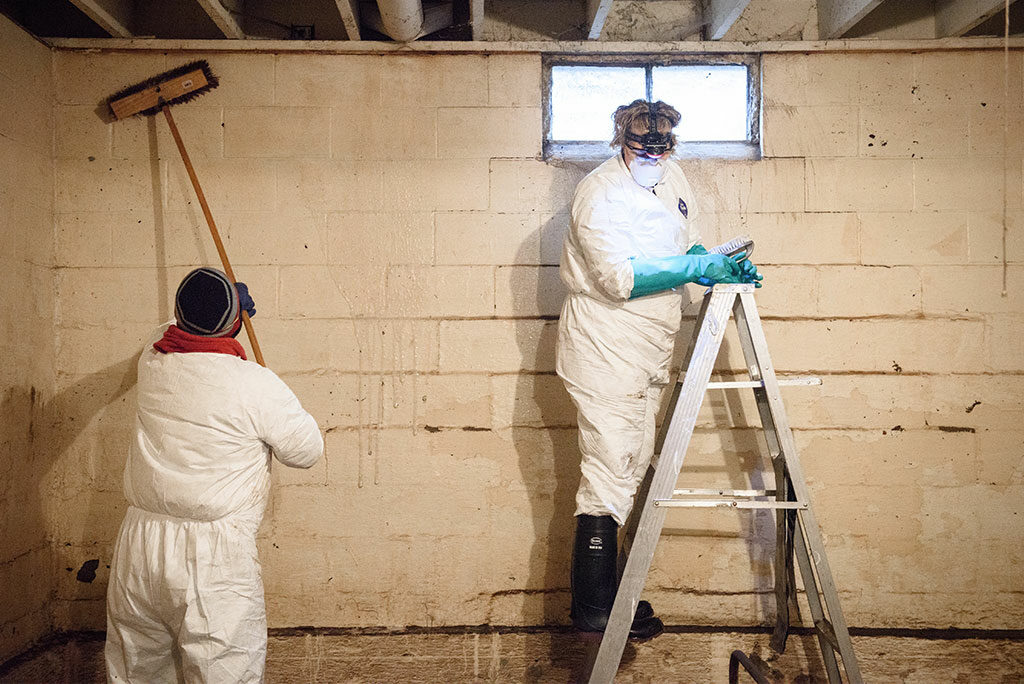
By Megan K. Mertz
During a four-day period last December, floods in the Midwest and tornadoes in Texas caused an estimated $1 billion in damages, according to the National Centers for Environmental Information.
Although the Dec. 26-29 disasters are no longer making national headlines, Lutherans across the country continue the slow and steady work of helping their neighbors rebuild.
Thanks to recent donations from LCMS members, LCMS Disaster Response is able to walk alongside congregations during the long-term recovery process. In just three months — from Jan. 1 to March 31 — 4,266 donors gave $626,685 to the Synod for flood relief or general disaster-relief work.
The Rev. Ross Johnson, director of LCMS Disaster Response, expressed his thanks to donors from across the Synod: “Your donations allow us to have the capacity to give generously to those congregations and individuals going through a time of need due to disasters, crises and other emergency needs.”
Long-term recovery
During that same three-month period, LCMS Disaster Response gave out national grants totaling $119,143 and spent $66,990 to help affected congregations assess the damage from these disasters and coordinate their responses to their communities.
St. Mark’s Lutheran Church in Eureka, Mo., received one of the larger grants — $20,000 to continue flood-relief work in Eureka and its neighboring communities, as well as $5,000 to purchase a disaster-response trailer. New Beginnings Lutheran Church in Pacific, Mo., received a $10,000 grant to continue flood-relief work in its surrounding communities, and also $5,000 for a disaster-response trailer.
In addition to the grants, Johnson purchased and delivered $11,000 in tools and supplies to congregations in Pacific, Eureka and Watseka, Ill. He also provided a total of $6,000 in gift cards for these congregations to distribute to their neighbors with immediate needs for clothing and food.
“In the areas of Eureka and Pacific, we realized that they didn’t have key gear in place for their volunteer teams,” Johnson said. “So, we immediately bought sufficient safety gear like gloves, masks and goggles, and also the tools that are needed, like power washers, wet-dry vacuums, power tools, crowbars, shovels and other items.
“Without the proper tools, it’s nearly impossible to muck out a home, especially when they are doing it day after day after day,” he continued.
In Pacific, some 200 homes were damaged by the Christmas floods. Although the “mucking out” phase is over, New Beginnings has shifted to helping neighbors replace drywall, install new flooring and complete other repairs.
Travis Torblaa, mission and ministry director at New Beginnings, estimates that his congregation will be sending out volunteer teams — who will be using the new trailer and tools from LCMS Disaster Response — for at least another year and a half.
“Something we’ve learned through this is that the recovery takes a long time. It’s not over in just a few weeks, but it goes on for months and years. It takes a toll on the individuals who go through the crisis, both emotionally and physically. … It’s a financial burden on them as well,” Torblaa said.
“As we come alongside those affected, and we’re able to perform acts of service in Jesus’ name, that’s really impactful,” he continued. “We’re very grateful for the support we’ve received from LCMS Disaster Response.”
Building capacity
Backing from the church in the form of donations received has increased the capacity of LCMS Disaster Response, districts and congregations to respond to future disasters.
In January, LCMS Disaster Response gave a $14,939 grant to Lutheran Church Charities and the LCMS Northern Illinois District to purchase commercial-grade pumps and the trailers necessary to move those pumps around from place to place.
“There’s a great need, especially in Illinois, to pump out basements, and we found that we didn’t have that capacity,” Johnson said. “These pumps have the capacity to pump out a typical basement within 30 minutes, and there was an agreement when we gave the grant that they would loan out the trailers with pumps to nearby districts and congregations so they can utilize them in a time of disaster.”
LCMS Disaster Response also used $88,418 to provide and deliver preparedness and training programs and materials to train LCMS members and partner churches for responding to their communities in times of disaster for years to come.
In the first week and a half following the flooding in Pacific, Dr. Craig Schmidt, service team leader for New Beginnings, estimated that more than 1,000 people came to help out.
“It was a remarkable thing to see that massive outpouring of relief from so many agencies who had already thought about this years or months in advance and had teams and trailers and trainings that had already been completed,” Schmidt said. “They were on the spot and ready to go.”
As the results of insurance claims become known, Johnson expects to disburse even more grants to the hardest-hit communities, and contributions received by the LCMS for Disaster Response will make that long-term work possible. Those grants are made possible by the available funds on hand at the time an application is approved.
Mark Hofman, executive director of LCMS Mission Advancement, expressed relief at seeing what has happened to the available fund balance over three months.
“Because our Synod’s disaster-response work, much like any mercy work we do, depends entirely on contributions designated for supporting this kind of work, you want to see that fund balance be as robust as possible moving forward because it represents what is possible in terms of long-term impact, training and service to those affected,” he said. “Those who gave of themselves can take great joy and quiet pride in knowing they have increased Disaster Response’s capacity to make a difference in communities touched by these kinds of events.”
He also noted that for the first time, the LCMS is making available a report on the three months of income and relief work made possible by donor contributions, fulfilling a promise made when the emergency appeal for gifts went out in January.
Opportunities to share the Gospel
In addition to equipping LCMS members through Lutheran Early Response Team training, LCMS Disaster Response also encourages congregations to be prepared to respond when a disaster strikes by pre-assembling “flood buckets.”
LCMS Disaster Response provides instructions and devotional materials to congregations, which then fill five-gallon buckets with cleaning tips, paper towels, cleansing powder, liquid cleaner, bleach, rubber gloves and other items. When a flood strikes, these buckets can be quickly distributed to the affected area.
“When you have a substantial flood, the resources you have available in your house or that are at the grocery stores get wiped out really quick,” Johnson said. “That’s why these buckets are so useful. They also include a devotional guide that provides a Gospel-centered message.”
When flash flooding damaged more than 40 homes in Kilgore, Texas, March 8-9, LCMS Disaster Response connected the Rev. Dr. Jayson Galler, pastor of Pilgrim Lutheran Church, Kilgore, with Beautiful Savior Lutheran Church in Arlington, Texas, which pre-assembles flood buckets as a way to assist area congregations dealing with a disaster in their community.
Beautiful Savior provided 50 buckets to Galler, who gave out about half of them at an event with about 100 people, including victims whose houses had been damaged. In the following days, members of Pilgrim took buckets to other families who had experienced water damage.
“They gave me the opportunity to speak during the program, to really speak some words of Gospel comfort,” Galler said. “The basic Gospel — the forgiveness of sins through Jesus Christ — but also God’s providential care and love and the way He works through neighbors, brothers and sisters in Christ in many cases, in the community to help them.”
For more information about ongoing disaster-response efforts:
- download the three-month financial report of income and expenditures at lcms.org/doc/drfinancial.
- watch a video update at youtu.be/ihVljm6ccYk.
- read an article from Lutherans Engage the World at reporter.lcms.org/2016/lcms-disaster-response-partners-with-missouri-churches-in-flood-relief.
Megan K. Mertz (megan.mertz@lcms.org) is a staff writer and managing editor of Lutherans Engage the World with LCMS Communications.
Posted May 4, 2016
